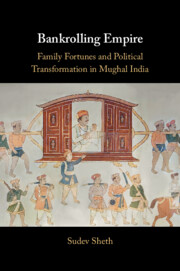Book contents
- Bankrolling Empire
- Bankrolling Empire
- Copyright page
- Dedication
- Contents
- Figures
- Maps
- Tables
- A Note on Translations, Transliterations, and Dates
- Acknowledgments
- Mughal Family Tree
- Jhaveri Family Tree
- Gaekwad Family Tree
- Haribhakti Family Tree
- Introduction
- 1 Prelude: The Mughal Empire, 1526–1750
- 2 Courtly Mutualism: The Emperor’s Jeweler Shantidas Jhaveri, 1628–58
- 3 Political Commensalism: Manekchand Jhaveri and Bankrolling Bids to the Throne, 1658–1707
- 4 Interlude: Cultivating Financial Crisis under Aurangzeb, 1660s–1719
- 5 Expedient Extortion: The Governor’s Golden Goose Khushalchand Jhaveri, 1719–30
- 6 Competitive Coparcenary: Vakhatchand Jhaveri and Brokering Politics, 1730–1818
- 7 Postlude: Bankrollers of Mughal Succession, 1750–1818
- Conclusion
- Book part
- Glossary
- Bibliography
- Index
2 - Courtly Mutualism: The Emperor’s Jeweler Shantidas Jhaveri, 1628–58
Published online by Cambridge University Press: 16 November 2023
- Bankrolling Empire
- Bankrolling Empire
- Copyright page
- Dedication
- Contents
- Figures
- Maps
- Tables
- A Note on Translations, Transliterations, and Dates
- Acknowledgments
- Mughal Family Tree
- Jhaveri Family Tree
- Gaekwad Family Tree
- Haribhakti Family Tree
- Introduction
- 1 Prelude: The Mughal Empire, 1526–1750
- 2 Courtly Mutualism: The Emperor’s Jeweler Shantidas Jhaveri, 1628–58
- 3 Political Commensalism: Manekchand Jhaveri and Bankrolling Bids to the Throne, 1658–1707
- 4 Interlude: Cultivating Financial Crisis under Aurangzeb, 1660s–1719
- 5 Expedient Extortion: The Governor’s Golden Goose Khushalchand Jhaveri, 1719–30
- 6 Competitive Coparcenary: Vakhatchand Jhaveri and Brokering Politics, 1730–1818
- 7 Postlude: Bankrollers of Mughal Succession, 1750–1818
- Conclusion
- Book part
- Glossary
- Bibliography
- Index
Summary
Chapter 2 focuses on the founding patriarch Shantidas Jhaveri’s activities in the early seventeenth century at the courts of Jahangir and his successor Shah Jahan. Jahangir was accustomed to the luxuries of the court, and grew fond of rare jewelry and other precious items. Shantidas established a formidable reputation as a fantastic jeweler and diamond dealer, one with the wealth and knowledge to procure rarities from around the world. Ships carrying such goods docked at the ports of Gujarat, and Shantidas and his agents purchased coveted items to then sell to high-ranking officials and Mughal emperors. The business activities of Shantidas took off after 1610. Given his close relationship with two successive Mughal emperors, I call this phase of Mughal-Jhaveri relations courtly mutualism since both sides gained from the interaction. This chapter identifies a range of sources including Persian chronicles, royal orders, religious praise poems in Sanskrit and Gujarati, and European travelogues to establish that Mughal-Jhaveri relations were initially symbiotic, setting the vantage point from which subsequent developments are analyzed.
Keywords
- Type
- Chapter
- Information
- Bankrolling EmpireFamily Fortunes and Political Transformation in Mughal India, pp. 71 - 108Publisher: Cambridge University PressPrint publication year: 2023

